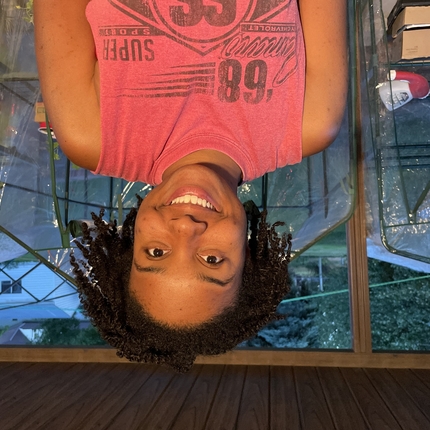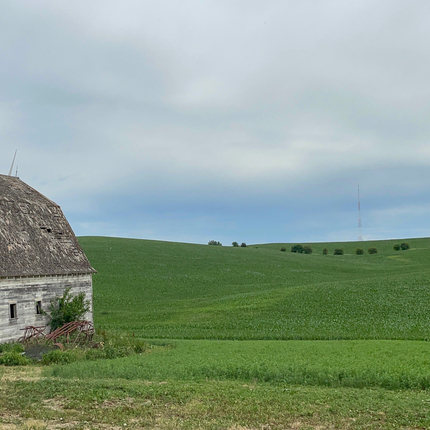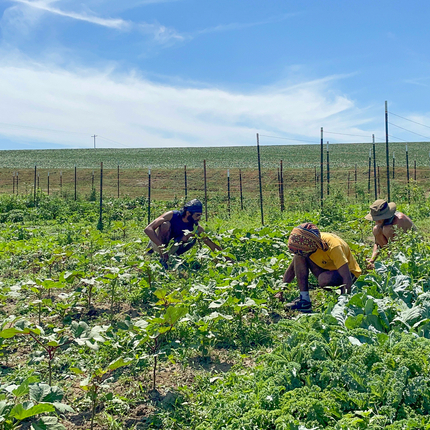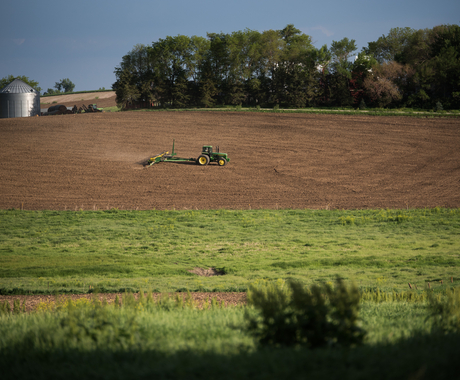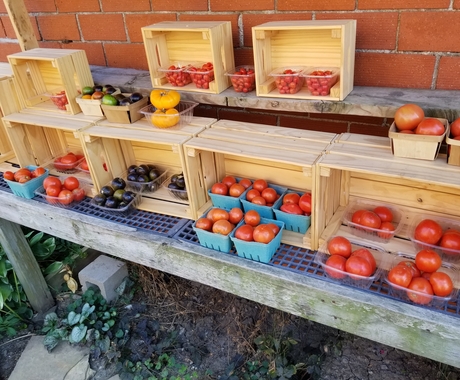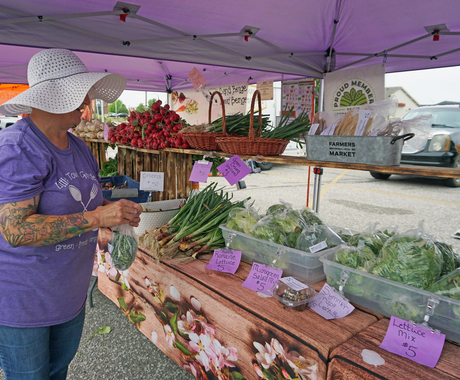As an avid cook, Kelsey Jones has always had an interest in creating new things and trying new foods. Several years ago, she transitioned to being a vegetarian and eventually to vegan. The more vegetables she ate, the more she wanted to learn about where her food came from.
So, whenever Kelsey moved somewhere new, she explored all the ways she could get fresh produce.
“I became less interested in conventionally grown produce and started seeking locally sourced vegetables from the farmers markets,” said Kelsey. “Even while living overseas from 2017 to 2019, I would explore farmers markets in Southeast Asia.”
When Kelsey and her partner, Lyle Marotz, returned to the U.S. in 2019, they settled outside of Hoskins, Nebraska, and decided they wanted to grow their own food.
A member of the Sunflower Cooperative in Omaha, Kelsey has been able to connect with other BIPOC (Black, Indigenous, and people of color) farmers, some of whom have volunteered their time to help Kelsey and Lyle with their growing season. Kelsey feels encouraged to have friends who support her vision.
Networking and connecting with other farmers not only gave Kelsey support, it led her to discover conservation practices and the potential benefits of implementing them on her plot of land.
“Intrinsically I knew it was best to be gentle with the land we are working with, but I just didn’t know what it needed to thrive,” she said. “The more questions I asked, the more opportunities to learn about conservation practices came about.”
One of those opportunities presented itself after a discussion about conservation with Center for Rural Affairs staff at the Practical Farmers of Iowa Conference this past January.
The Center recently started a program for beginning farmers and ranchers who would like guidance in implementing conservation programs. Kelsey applied for the inaugural year of the Center’s Beginning Farmer Conservation Fellowship Program, and was chosen.
“Center staff are very passionate about helping farmers in general, and also passionate about helping young farmers and BIPOC farmers,” said Kelsey. “So much of the farming industry is new to me, but I felt that I’d be in good hands with any and all information they could offer me.”
Kelsey thought applying for the Beginning Farmer Conservation Fellowship Program made perfect sense for her and would be a good fit.
“The health and well-being of my family, friends, and community all motivate me to farm,” she said. “From the time I was a kid, knowing that I enjoyed making food, I knew I wanted to feed a lot of people when I got older. I thought that would be a restaurant or cafe, but it actually was becoming the source of it all, a farmer. Now, I want to learn how to take the best care of our land and establish a good and impactful relationship with the land I am working with.”
The fellows will complete coursework in conservation programs and practices, climate change adaptation and impacts, racial equity, and leadership. Fellows will design and implement a conservation project on their own farm or land they are farming, and present their findings at the annual Nebraska Sustainable Agriculture Conference in February, when the program will end.
“Benefits of conservation outweigh the risks,” said Kelsey. “It simply makes sense to take care of the land. I don’t want to use harmful chemicals in our garden plot that’s intended to grow food for human consumption. I don’t want to overwork the soil and strip it of necessary nutrients to grow healthy crops. Those are huge reasons why conservation is a top priority for me. We have enough farms that have sold out to a culture of pumping the earth with toxins, demolishing forests, and polluting the air. I want to heal the earth in any and all ways that I can.”
Today, Kelsey and Lyle are the sole owners and operators of Source Farms, on about half an acre of land. They raise crops that grow best in the northeast Nebraska climate, as well as ones they personally enjoy. The small vegetable market farm is home to a variety of seasonal produce from spring to fall including kale, Swiss chard, radishes, beets, okra, a variety of hot peppers and tomatoes, celery, herbs, and more. They have experimented with growing microgreens as well.
They have already begun implementing a few conservation practices, and are excited to try more. During the past year, they began growing additional flowers and herbs to attract beneficial insects.
“We chose them because they are simple to start from seed, and proved to increase the number of butterflies, bees, and wasps we saw this year,” said Kelsey. “We did multiple sowings of dill seeds, which attracted beautiful swallowtail butterflies.”
Through her time in the fellowship program, Kelsey hopes to achieve a successful sowing of cover crops and learn more about other conservation practices from other fellows, as well as from the classes they’ll take.
“We plan to continue growing the crops that have proven to do well at our farmers market,” she said. “We are interested in learning more about seed saving and building infrastructure that can help our operation run as efficiently as possible.”
Eventually, Kelsey and Lyle hope to hire their first employee, and until then continue to try new things and enjoy the process as it unfolds.
“I like growing a variety of plants, some I’ve never heard of,” said Kelsey. “My family, friends, and farmers market community are always excited to see and try something new from the farm. Seeing people’s curiosity piqued from what we grow and knowing they are willing to try something different (and something good for them) is a huge motivation for me to continue farming.”
Click here to learn more about the Center’s Beginning Farmer Conservation Fellowship Program.
Feature photo submitted by Kelsey Jones.
Farm and Food

